Natural Remedies for Wrinkles
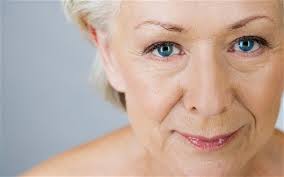 Women are marketed to daily in an effort to buy expensive injections, chemical peels or creams and serums costing hundreds of dollars, all to smooth out wrinkles and make thjem look younger. This beauty industry focuses entirely on external issues and doesn't look internally. Your skin reflects the health of your whole body from the inside out. It shows a story of stress, toxins in your food, chemicals in your environment, and of course lifestyle choices. There isn't a magic bullet to repair the skin from all that, but there are natural alternatives for slowing aging and reducing wrinkles. Here are a few natural ways to reduce wrinkles that are proven effective.
Women are marketed to daily in an effort to buy expensive injections, chemical peels or creams and serums costing hundreds of dollars, all to smooth out wrinkles and make thjem look younger. This beauty industry focuses entirely on external issues and doesn't look internally. Your skin reflects the health of your whole body from the inside out. It shows a story of stress, toxins in your food, chemicals in your environment, and of course lifestyle choices. There isn't a magic bullet to repair the skin from all that, but there are natural alternatives for slowing aging and reducing wrinkles. Here are a few natural ways to reduce wrinkles that are proven effective.
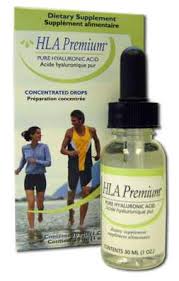 There are some natural compounds that offer a dramatic improvement in skin texture by increasing hydration and increasing the level of moisture in the outer layers of skin. Hyaluronic acid is very effective at preserving the moisture content of the skin. As we get older, our skin gets dry and we gradually lose moisture. By using hyaluronic you can improve the overall texture of your skin and add volume; which gives the appearance of reducing your fine lines.
There are some natural compounds that offer a dramatic improvement in skin texture by increasing hydration and increasing the level of moisture in the outer layers of skin. Hyaluronic acid is very effective at preserving the moisture content of the skin. As we get older, our skin gets dry and we gradually lose moisture. By using hyaluronic you can improve the overall texture of your skin and add volume; which gives the appearance of reducing your fine lines.
Hyaluronic acid is a well-researched compound that has been used and approved for years for various medical procedures. Recently, the FDA approved hyaluronic acid (Restylane) for cosmetic applications; injected in gel form, it acts as a filler to remove wrinkles. In the skin, hyaluronic acid fills the space between collagen and elastin fibers, delivering nutrients and hydrating skin by trapping water, and acting as a cushioning agent.
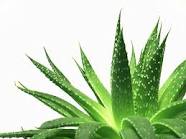 Aloe is an established topical remedy for skin. But a 2009 study found taking aloe orally reduces facial wrinkles. In the study, 30 healthy women over the age of 45 took aloe vera gel as a supplement. One group took a low dose (1,200 mg/day) and a second group took a high-dose (3,600 mg/day). The researchers measured signs of skin aging at the beginning and end of the study. After just 90 days, the researchers found that facial wrinkles improved significantly in both groups. But in the lower dose group facial elasticity also improved.
Aloe is an established topical remedy for skin. But a 2009 study found taking aloe orally reduces facial wrinkles. In the study, 30 healthy women over the age of 45 took aloe vera gel as a supplement. One group took a low dose (1,200 mg/day) and a second group took a high-dose (3,600 mg/day). The researchers measured signs of skin aging at the beginning and end of the study. After just 90 days, the researchers found that facial wrinkles improved significantly in both groups. But in the lower dose group facial elasticity also improved.
How does it work? The researchers found that the aloe increased collagen production leading to better structural support of the skin and fewer wrinkles. They also found aloe decreased gene activity that causes collagen to become damaged in the first place.
Aloe gel contains over 200 healing phytonutrients. If you have access to an aloe plant you can get the gel from the leaves. Just make sure to drain the red "latex." It can cause diarrhea. Add the gel to fruit juice or your favorite smoothie. When buying aloe vera juice make sure you avoid products with added sugars or preservatives. It should be at least 85% aloe vera juice.
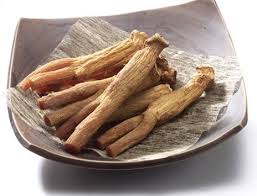 Red ginseng contains antioxidants, immune boosters, and anti-aging agents. In a study in Korea, 82 healthy women volunteers over 40 years of age participated in a double-blind, placebo controlled study. Every day the women received either a placebo or 3 grams of an herbal mixture containing red ginseng extract. The researchers measured facial wrinkles, skin elasticity, water content, erythema (red patches), and pigmentation before and after the trial. Facial skin samples were taken before and after treatment, and wrinkle-related biochemical markers were also measured.
Red ginseng contains antioxidants, immune boosters, and anti-aging agents. In a study in Korea, 82 healthy women volunteers over 40 years of age participated in a double-blind, placebo controlled study. Every day the women received either a placebo or 3 grams of an herbal mixture containing red ginseng extract. The researchers measured facial wrinkles, skin elasticity, water content, erythema (red patches), and pigmentation before and after the trial. Facial skin samples were taken before and after treatment, and wrinkle-related biochemical markers were also measured.
At the end of 6 months, the researchers found facial wrinkles were significantly improved in the women taking the red ginseng extract. In addition, several biochemical markers of wrinkle damage also improved.
How does it work? The researchers found that the red ginseng increased collagen synthesis in the dermis. They called red ginseng an effective "beauty food." Red ginseng is a form of unpeeled and steamed Panax ginseng (also known as Asian or Korean ginseng). It is said to have "heating" properties that improve circulation. Don't confuse it with American or Siberian ginseng.
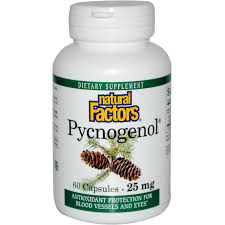 A 2012 Japanese study involving 112 women found pine bark extract (also known as Pycnogenol) is safe and effective in significantly improving skin color and reducing pigmentation of age spots due to mild to moderate photoaging.
A 2012 Japanese study involving 112 women found pine bark extract (also known as Pycnogenol) is safe and effective in significantly improving skin color and reducing pigmentation of age spots due to mild to moderate photoaging.
Japanese researchers divided the women into two groups. One group received 100 mg of pine bark extract every day while the other group received only 40 mg. After 12 weeks both groups had a significant decrease in signs of photoaging.
In the study, women took the standardized pine bark extract marketed as Pycnogenol. The researchers found the Pycnogenol significantly improved hydration and elasticity of the women's skin. It also significantly increased the activity of an enzyme that's critically involved in the synthesis of hyaluronic acid. Hyaluronic acid increases skin moisture and minimizes the appearance of wrinkles.
The Pycnogenol also affected genes involved in the creation of new collagen. The researchers believe that supplementing with Pycnogenol can help counteract the clinical signs of skin aging. But pine bark extract doesn't just help your skin. It also supports heart and arterial health and reduce the risk of diabetes and arthritis.
5. Dietary Fats & Vegetables
 What you eat can have a big impact on wrinkles. In one Japanese study of 716 women, researchers measured skin hydration, surface oil, and elasticity. They also measured facial wrinkles in the crow's feet area around the eyes. The women also reported on their usual diet habits. The researchers found that women who ate more total fat, saturated fat, and monounsaturated fats had significantly better skin elasticity.
What you eat can have a big impact on wrinkles. In one Japanese study of 716 women, researchers measured skin hydration, surface oil, and elasticity. They also measured facial wrinkles in the crow's feet area around the eyes. The women also reported on their usual diet habits. The researchers found that women who ate more total fat, saturated fat, and monounsaturated fats had significantly better skin elasticity.
Women who ate more green and yellow vegetables also had significantly fewer wrinkles.
Not all fats are created equal! There are good fats and bad fats. Avoid vegetable oils, which are refined, bleached and deodorized! They can make skin worse and increase infalammation. Good sources of fats are:
- wild caught salmon
- grass-fed meat and dairy products like butter and yogurt
- pastured poultry and eggs
- coconut oil
- olive oil
Green and yellow vegetables are rich in antioxidants and beta carotene which promote clear skin. Healthy choices include:
- kale, spinach, broccoli, Swiss chard, collards, mustard greens, cabbage, and arugula.
- Yellow bell peppers, winter squash, zucchini, and tomatoes.
